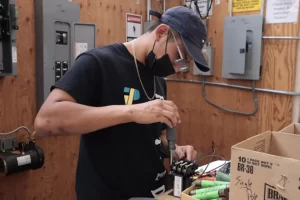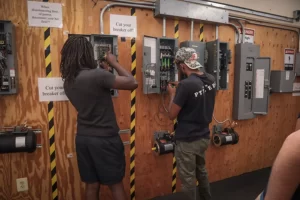As an electrician qualified from a trade school, you are a skilled person who undertakes highly technical work. With strict licensing prerequisites in almost all nations across the United States, you will have expended many years of understanding your trade school.

Nonetheless, these requirements differ from state to state. It is essential to understand the electrician licensing laws that are particular to the state where you schedule to work, whether you are a journeyman, an apprentice, or a master electrician.
Being an electrician is not just a business but a strong career path. Electrical contractors admire many job opportunities and earn a decent income. There is also job safety. Customers will always require skilled trade schools to install and service electrical networks in their businesses and homes.
The U.S. BLS (Bureau of Labor Statistics) documents that there are 729,600 electricians all across the nation and 19,390 jobs in Pennsylvania. The national amount is indicated to grow nine percent from 2020 to 2030.
Many contractors all across the nation are trying to discover skilled tradesmen. Per the AGC (Associated General Contractors) of America, 2020 AGC-Autodesk Workforce Survey, sixty percent of companies in the U.S. and 37% of Pennsylvania had unfilled hourly craft roles like electricians, plumbers, and HVAC technicians. So, if you receive the training you require, you will have a lot of businesses to choose from when you are ready.
The procedure of becoming an electrician seizes time, but you get paid while you understand and gain experience.
Is a license mandatory for electricians in Pennsylvania? The answer is not always. To legally conduct training for electricians in Pennsylvania, you must acknowledge the state’s Home Improvement Consumer Protection Act. The nation of Pennsylvania doesn’t give state licenses, statewide registration, or certification for electricians. Every 2,562 municipalities retain its license provisions for plumbers, electricians, and HVAC contractors.
Electricians must accept the construction enterprise guidelines and building laws in the region they plan to work.
Gain work knowledge in the electrical area
Attain electrical journeyman license
Attain electrical contractor license
There are three widespread paths to developing the practical experience required to become an electrician in Pennsylvania:
It is feasible in some Pennsylvania communities to become a licensed journeyman by obtaining adequate on-the-job knowledge and passing an exam published by the ICC (International Code Council) in the city or county you plan to function. Several Pennsylvania cities, such as Philadelphia and Pittsburgh, do not give journeyman electrical licensing. Nonetheless, most electrical contractors want you to obtain an apprenticeship before hiring you for a full-time journeyman electrical technician training course. Giving evidence of finalizing an apprenticeship often is sufficient to show your professional knowledge and get hired.

You can apply for a license to conduct electrical contracting after functioning with a regional electrical contractor or having a journeyman license for some years. As with maximum journeyman licenses, provisions vary; you must review local statutes for your region’s electrical contractors and master electricians.
Some countries and cities offer master electrical licensing, journeyman electrician licensing, and electrical contractor licensing. Check with the regional government where you plan to work to infer what licensing the municipality expects.
You will see many advantages of seeking a Pennsylvania electrician license:
Education at some Pennsylvania community colleges amounts to about $16,800 yearly for in-state students. Also, an extra $1,100 for materials and books. All certifications and licensing comprise additional expenses for application and testing fees. The overall expense may differ depending on your choice of initial electrical technician program.
There are no statewide licensing provisions, so the amount of time to attain licensing differs. Aspiring electricians commonly anticipate spending 3-5 years gaining field knowledge and receiving around 750 to 900 hours of classroom exercise.
Read More